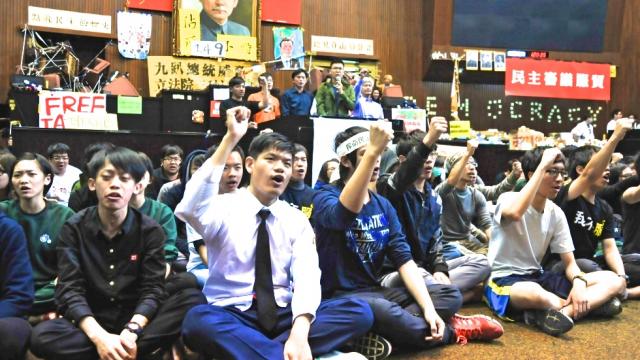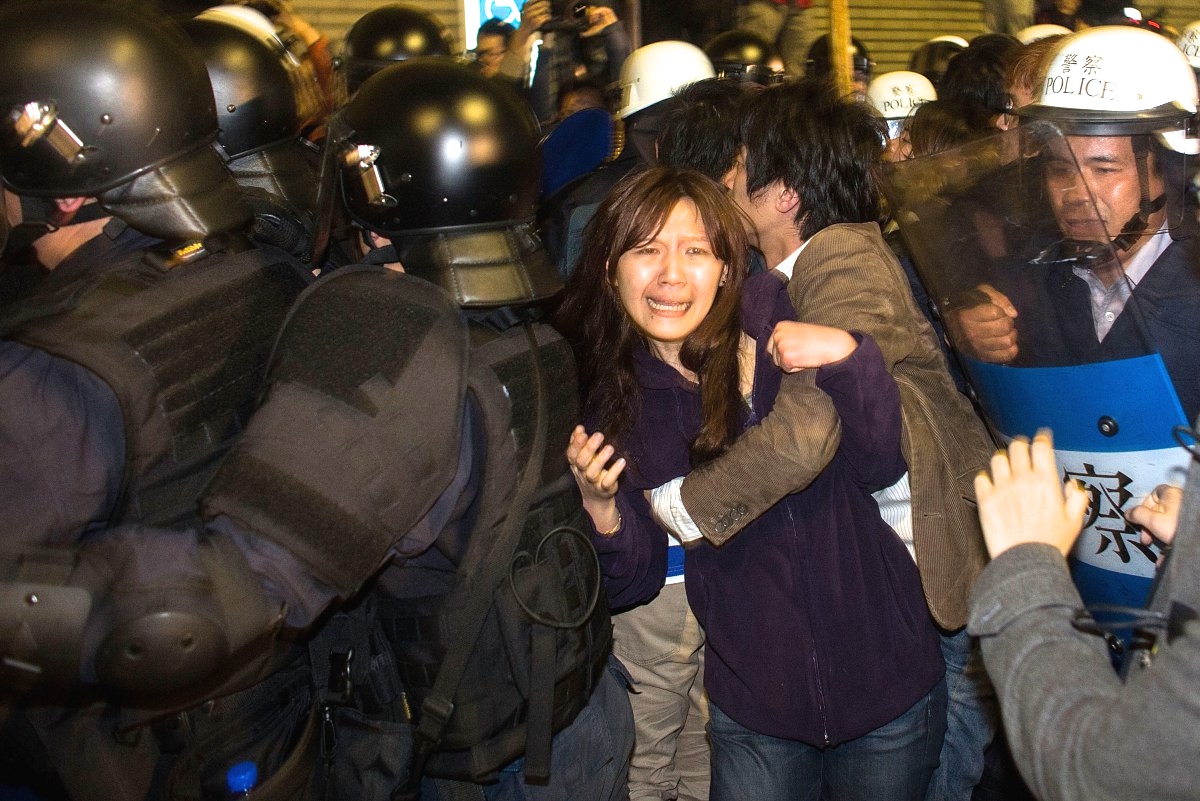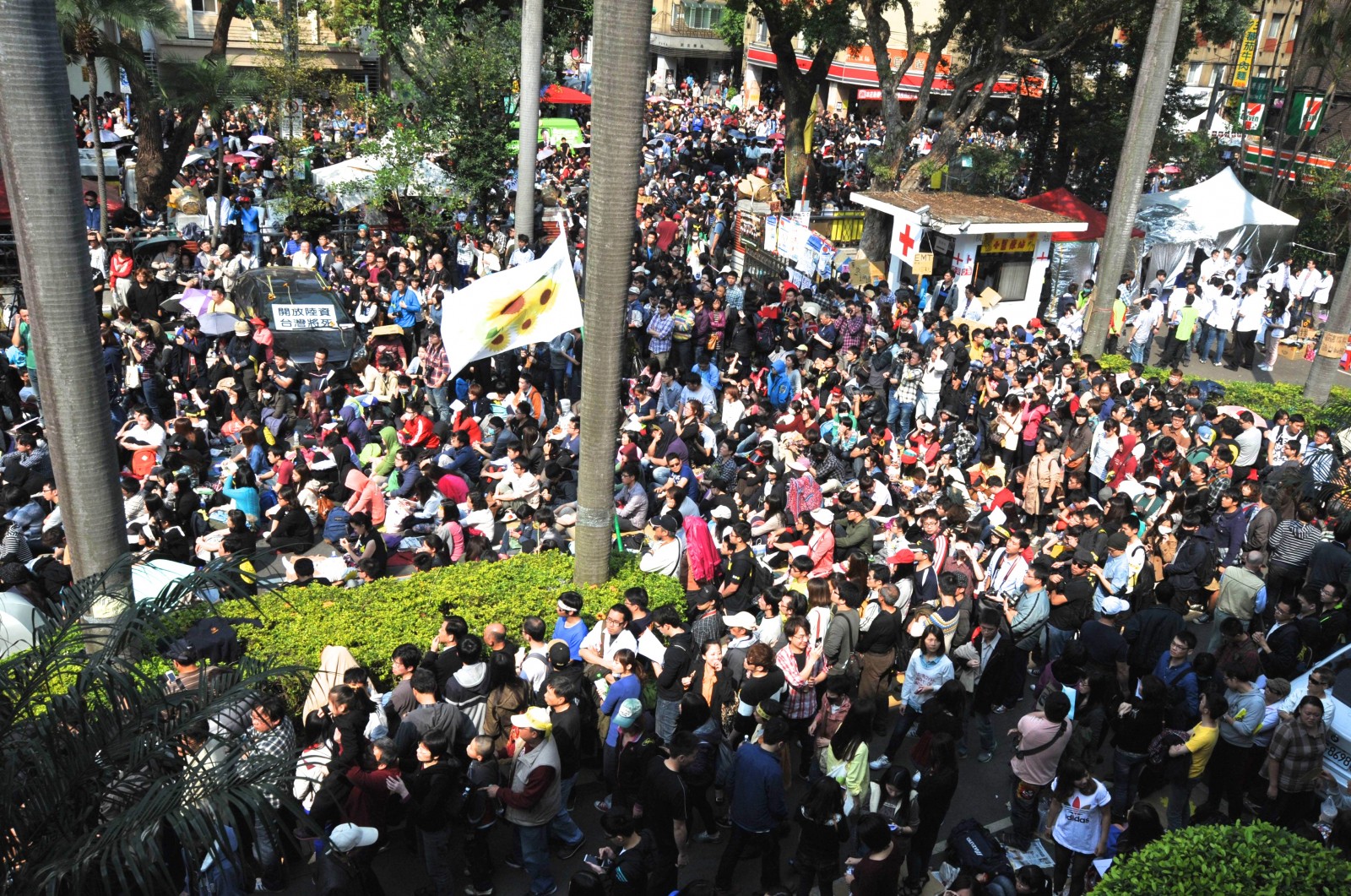
An occupation of the Taiwanese parliament is now in its second week as student protestors prepared Tuesday to meet President Ma Ying-jeou to demand he put the breaks on a trade agreement with China which they say would devastate Taiwanese workers and small businesses while threatening the island’s national identity.
“This morning we received notice that the president is willing to meet with us to discuss our demands,” student leader Chen Wei-ting told Occupy.com early on Tuesday. “We, along with the civic organizations here, have agreed to the talks. We are cautiously optimistic that the president is willing to substantively address our demands.”
However, later Tuesday, following the breakdown of bipartisan talks hosted by Speaker Wang Jin-pyng, the president's meeting with student leaders was suddenly suspended.
"Our demands require the consensus of the legislature to proceed," said activist Jiho Chang. Now, "the latest breakdown suggest to us that the meeting with Ma will be used as a propaganda weapon against us.
"Furthermore, the presidential spokesperson had failed to discuss with us the time, location or format of the meeting with us," said Chang, and thus "the discussion would have been on their terms, according to their agenda. This is something we cannot accept."
Around 200 protestors forced their way into the Legislative Yuan in Taipei last week after the ruling Kuomintang party (KMT) attempted to push through the Cross-Strait Service Trade Agreement (CSSTA) with China, bypassing a previously agreed item-by-item review of the bill.
Critics say that competition from big Chinese businesses, which would be free to invest in Taiwan under the terms of the agreement, will crush smaller businesses that make up most of Taiwan’s largely service-based economy.
Hsin-Huang Michael Hsiao, director of the Institute of Sociology at the Academia Sinica in Taipei, told Occupy.com, “There are groups [in Taiwan] who will benefit from this trade pact, big business and especially the financial sector [who] want to open their banking operations in China. But who loses? The majority of the public.”
There are also concerns that the deal could see Chinese companies take control of Taiwan’s Internet and telecommunications networks, as well publishing, book distribution, and cinemas.
“Enterprises in mainland China agree with their government that censorship is the normal condition for citizens’ lives,” said Zhou-jing Kong, a professor of philosophy at National Taiwan University of Arts who is collaborating with the student protestors.
“But in Taiwanese society we cannot accept these values. We are worried that if this agreement is passed, our Internet and telephone [networks] will become instruments of censorship by mainland China.”
The students say their protest is less about the economic impact of any potential trade agreement than about defending the democratic process.
“The crisis and the controversy over the CSSTA has less to do with free trade than with the manner in which it was processed,” the student leader Chen explained. “The agreement was drafted, negotiated and signed… in a completely closed-door process without public input.”
Chen is a member of the Black Island Youth, one of a number of student groups that have joined together in what is being called the “Sunflower Revolution.” He says the name was not thought up by those occupying the legislature, but that the bright flower held aloft by protestors outside the building suits their aim of “shining light” on the Taiwan government’s secretive negotiations.
It is also a nod to Taiwan’s history of student protests and civil action: the “Wild Lily” student movement of the early 1990s played a major role in bringing democracy to Taiwan. Hsiao, at the Academia Sinica, Taiwan’s national academy, says he has taught two generations of activists and is gratified to see the resurgence of a student movement that had gone into decline over the last decade.
“The cause of the movement now is twofold,” said Hsiao. “The students’ first cause is to save democracy, which has been damaged under by the KMT government. The second cause relates to China.
"In the 1980s and ’90s, China was not a factor. The students’ concerns were domestic: to get rid of authoritarianism and install democracy. But now we are worried that a bigger authoritarian regime, China, will work with the KMT to undermine Taiwan’s new democracy.”
Taiwan has had self-rule since 1950, but is not represented at the United Nations and is viewed by China as a “renegade territory,” which could, in theory, be reclaimed at any time. To many Taiwanese, the trade deal looks like an attempt by China to make that claim by economic means.
“Fundamentally, this is really about Taiwan’s national identity: how Taiwan is recognized internationally, but also about Taiwan’s own self-identity, which is still a major issue,” said Chao-Tsai Chiu, an artist who demonstrated outside the legislative building every day for the last week in support of the students’ demands.
Chiu is one of many Taipei residents who have made joining the protest after work a daily routine, often staying until the early hours of the morning. He describes how, when the students first occupied the legislature, police surrounded the building to block supplies of food and water from reaching the protestors.
Thousands of demonstrators then formed a crowd encircling them chanting, “If the police don’t move, we won’t move” – effectively a case of protestors kettling the police.
Since then, many more thousands of students have joined them from other parts of the country.
“It is still a student-led protest,” said Chen. “But over the past week [inside] the legislature, we have also been joined by academics, civil organizations, lawyers, doctors… Every night our protests swell up in excess of 30,000 people around the legislature. While most may be students, there have also been families, office workers – all people whose jobs and livelihoods may be impacted by the trade deal.”
Reports describe an orderly affair with food being distributed though the crowd and garbage collected for recycling, while supplies are hoisted up to protestors inside the legislature through a second-floor window. But on Sunday, after five days in which President Ma refused to respond to the students' demands, some protestors outside the legislative building attempted to occupy the Executive Yuan – where the Taiwanese cabinet meet – and were forcibly ejected.
“Unfortunately, police in full riot gear, under orders from President Ma and Premier Jiang Yi-huah, violently beat them back and cracked down against the unarmed students,” said Chen. “More than a hundred have been sent to the hospital.”
Some commentators believe the negative press generated by images of bleeding protestors contributed to President Ma’s decision to meet the protestors. But it remains to be seen whether the encounter with the head of state, when it finally occurs, can yield any meaningful resolution. Given Taiwan’s history of civil protest and the emotional as well as economic implications of the trade deal, both sides appear dug in and unwilling to cede ground.
“Although we are very tired from the past eight days, I think that I can speak for everyone here when I say that we have no exit strategy,” added Chen. “The only one that should be thinking about an exit strategy for this crisis is President Ma. We have every intention of carrying on if our demands are not met. On behalf of the Taiwanese people, we are writing history.”
3 WAYS TO SHOW YOUR SUPPORT
- Log in to post comments
















